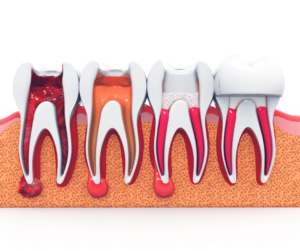Root Canal Therapy
Our highly trained dentist use the latest techniques and equipment to provide the best possible outcome.Root canal therapy, also known as endodontic therapy, is a dental procedure performed to treat a tooth that has a diseased or infected pulp (the innermost part of the tooth).
The pulp contains nerves, blood vessels, and connective tissue. When it becomes infected or damaged, it can cause severe pain and may lead to the loss of the tooth if left untreated. 
Here’s an overview of the root canal therapy process:
1. Diagnosis: The dentist begins by examining the tooth and taking X-rays to determine the extent of the infection or damage to the pulp. Symptoms that may indicate the need for a root canal include severe toothache, sensitivity to hot and cold, swelling of the gums or face, and a pimple-like bump on the gum near the affected tooth.
2. Local Anesthesia: Before starting the procedure, the dentist administers local anesthesia to numb the tooth and the surrounding area, ensuring that the patient is comfortable and pain-free during the treatment.
3. Access Opening: The dentist creates a small access opening in the crown (top) of the tooth, allowing access to the pulp chamber and root canals.
4. Removal of Infected Tissue: The infected or damaged pulp tissue is carefully removed from the pulp chamber and the root canals. The canals are then cleaned and shaped to remove any remaining debris and bacteria.
5. Filling and Sealing: After cleaning and shaping the canals, they are filled with a biocompatible material called gutta-percha to seal them off and prevent further infection. The access opening in the crown is also sealed with a temporary or permanent filling.
6. Restoration: In many cases, a tooth that has undergone a root canal will require additional restoration, such as a dental crown. This crown is placed over the tooth to protect it and restore its functionality and appearance.
Root canal therapy is a highly successful and common dental procedure that allows patients to retain their natural teeth even after severe infection or damage to the pulp. It relieves pain and discomfort and can help maintain oral health. If you suspect you may need a root canal, it’s essential to consult with a dentist promptly to evaluate your condition and discuss the appropriate treatment plan.

